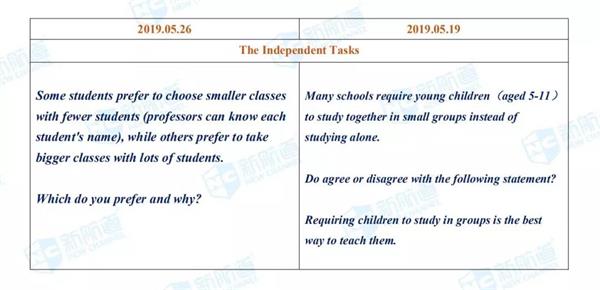独立写作题目

从“方便”和“高效”的角度而言,大家可以把“小”组学习(small groups)的优势的相关内容(包括理由和语言)准备到位。
接下来,我们就为大家展示(主体部分其中一个段落的)内容素材和语言材料:
我们从“互动”— 这个大家立刻会想到的点出发:
Individual study, as it provides no interaction with peers, may render a learner’s reception and digestion of information slow, and a small class is more likely to be interactive than a large one. 【句话,明确从“互动”切入】 Many students learn effectively in the kinesthetic mode, in which they act out information to their teacher or their peers and, as a result, understand and command knowledge. 【第二句话,阐明“互动”的必要】【接下来,进行比较】 However, the teacher is shared by the whole class, and thus he or she cannot attend every individual’s learning process. This makes peers important. Learners have recipients of information they act out, and by contrast, individual study does not have this benefit. 【刚才,首先比较了group比individual在互动方面的优势。】 【然后,比较a small group比a large group在互动方面的优势。】 Also, in a large class, a “performer” (of information) may be shy in front a big crowd of audience and unable to perform or perform well. The performer may otherwise feel less stressed and more comfortable in front of a small crowd and may be able to interact with everyone in the group. As the environment puts less strain and is friendlier, the small group is better than a large one. 【从而形成一个small group“一胜二”的段落】
词汇表:
reception: (不可数名词):接收(信息、信号)
digestion:(不可数名词):领悟(信心、事实)
interactive:(形容词):互动的、有互动的
kinesthetic:(形容词):动觉的
act out:(动词词组):将…表演出来
attend:(及物动词):参与
recipient:(可数名词):接受/收者
a crowd of:一群(人)
strain:(不可数名词/可数名词):紧张(感、的状态)
